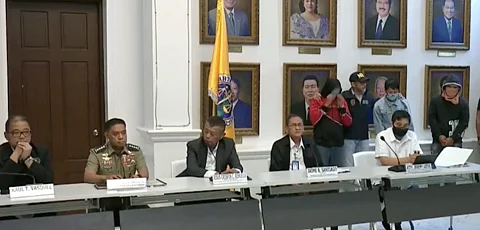
- NEWS
- the EDIT
- COMMENTARY
- BUSINESS
- LIFE
- SHOW
- ACTION
- GLOBAL GOALS
- SNAPS
- DYARYO TIRADA
- MORE

The Armed Forces of the Philippines (AFP) is delving into the overall espionage efforts of the Chinese government in the country after the arrest of a Chinese national and two Filipino “cohorts” allegedly conducting spying activities.
This was the statement from AFP chief General Romeo Brawner Jr. during a press conference at the headquarters of the Department of Justice on Monday, shortly after the government presented the alleged Chinese sleeper cell.
Just last month, the authorities confirmed the retrieval of a Chinese submarine drone in the seawaters of San Pascual, Masbate.
However, Brawner said the military is yet to verify the connection between the spy drone and the arrest of the Chinese sleeper cell.
“But we're just looking into the overall espionage effort of China. Because we believe that the drone was made in China, but the specific data that it obtained, we're still looking into it through our forensics,” he explained.
Asked if the sleeper cells were possibly operating military targets, Brawner replied, “Yes, that is very possible.”
Brawner likewise mentioned that the Chinese spies monitored access and visited various Enhanced Defense Cooperation Agreement (EDCA) sites.
“When we looked at the areas where this group went to, we saw that they’re going into some EDCA sites. So it's very possible that the coordinates and the topography could be used for military targeting purposes,” he said.
Arrested Chinese spy
The Chinese spy was arrested while inside a vehicle driven by the two Filipinos.
According to National Bureau of Investigation (NBI) Cybercrime Division chief Jeremy Lotoc, the arrested Chinese spy was a specialist in “control engineering.”
Citing open-source intelligence with the assistance of the AFP, Lotoc said the Chinese spy was a graduate of a university controlled and operated by the People's Liberation Army (PLA), a military organization of the People’s Republic of China.
“Meron na po silang mapa kung saan iikot. In fact, ang plano po nila pagkatapos nilang maikot yung buong Luzon, yung next target nila buong Visayas at Mindanao (They even have a map where they will go. In fact, their plan is that after they cover the entire Luzon, their next target will be the whole Visayas and Mindanao),” Lotoc lamented.
Lotoc said the arrested Chinese national, who was seemingly conducting espionage activities, has been in the Philippines for “more or less five years.”
“Tinawag namin syang sleeper kasi throughout our monitoring, yung galawan niya talagang nasa normal lang, kaya niyang mag-blend in sa iba't ibang grupo. Hindi po sya pansinin (We call him sleeper [cell] because throughout our monitoring, he was acting normal and can even blend with different groups. He doesn’t draw attention),” he pointed out.
Spied info transmitted
NBI Director Jaime Santiago believes that the information gathered by the spy may have already been transmitted to their base in China.
“Because they are using the equipment of real-time kinematics and global navigation satellite system. So possibly, they were able to transmit it in real-time—as soon as they got the information, it was transmitted immediately,” he said.
Lotoc seconded that upon checking the Information and Communication Technology (ICT) equipment retrieved from the spy, they noticed an application capable of remotely accessing the devices over the Internet.
“We saw a profile name there, written in Chinese characters, which is actively siphoning the data from the ICT equipment. So we believe that it's real-time, while they are collecting data from different sites — automatically, the user is collecting it remotely over the Internet,” he said.
Espionage
Meanwhile, Brawner sees the Chinese espionage starting as early as last year, when a high-tech and military-grade device was retrieved from the possession of a Chinese national identified as Yuhang Liu, who was arrested for pointing a gun in Makati City.
The suspect previously claimed to be a Philippine Offshore Gaming Operator (POGO) employee.
The arrest stemmed from a complainant's call who said Liu coerced him into delivering unidentified communication hacking devices to the suspect's residence.
Defense Secretary Gilberto Teodoro Jr. previously stressed the need to amend the country’s espionage law to make it stiffer, allowing the government to enforce punishment for the act being done during “times of peace.”
